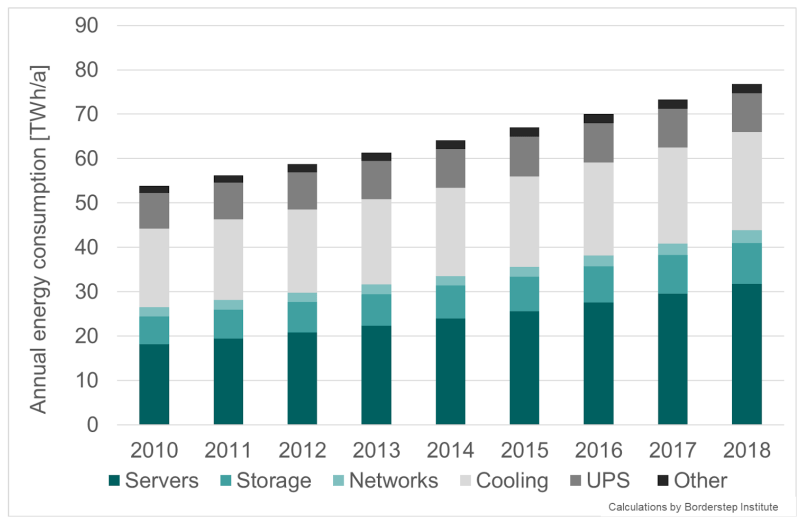Sustainability, climate-neutrality, energy-efficiency are the talk of the time. Governments, industries and institutions are making substantial leaps in order to achieve these parameters. As we are heading towards digital societies, the total ICT contribution towards pollution and carbon emissions also increases. With the onset of technologies like 5G, IoT, smart sensors, big data analysis, satellites, AI, deep learning, media and video streaming, so on and so forth, the demand for cloud and data processing infrastructure has increased many folds. All sectors, from housing to energy, transport, healthcare, education, banking, industry, entertainment will strongly rely on cloud and specifically on the interactions of traditional and cloud data centers.
From the European perspective, in 2018 the energy consumption of data centres in the EU was 76.8 TWh expected to rise to 98,52 TWh by 2030, a significant 28% increase. The share of cloud data centres accounted for 10% of energy consumption of data centers in 2010, which increased to 35% by 2018 and is expected to rise to 60% by 2025. By 2025, the share of EDGE data centers are expected to account for 12% of energy consumption of data centers. The development of the various key digital technologies will significantly change the way traditional sectors are conceived.
 Fig: Development of the energy consumption of data centres in the EU28 in the years 2010 to 2018
Fig: Development of the energy consumption of data centres in the EU28 in the years 2010 to 2018
It is often argued that the overall directionality of the ICT sector as it is used is unsustainable. Without dramatic increases in efficiency, the ICT industry could use up to 20% of all electricity and emit up to 5.5% of the world’s carbon emissions by 2025.
This article by the European Commission, contains a comprehensive report on the current state of the cloud computing industry, the state of the art technologies and the policies in effect for an eco-friendly cloud market.
The recommendations on the future policies will pave the way for future cloud computing technologies and data center roadmapping and identification.
At Digital for Planet, we undertake this challenge with a dedicated working group on Green Cloud-Edge-IoT Computing. The idea of this group is to involve experts from industries, academia, public organisations and associations to come forward with ideas, discussions, solutions about the sustainability and climate-neutrality of cloud computing technologies. One of the aims of the working group is to utilize the European Commission’s green deal project calls to put forward innovative ideas into proposals.
Digital for Planet - D4P © 2025 | All rights reserved